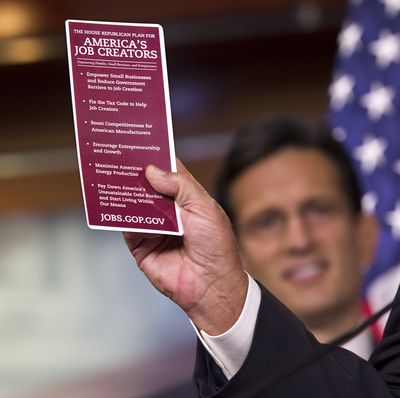Congress cranks out ‘jobs’ bills, but few jobs
Despite robust marketing, legislation falls in great divide

WASHINGTON – With the economy and jobs remaining voters’ top priority, almost every bill in Congress is now declared a “jobs” bill.
Barely a week goes by without House Speaker John Boehner reaching into his suit-jacket pocket to pull out a long maroon card printed with the 15 “jobs” bills that passed the Republican-led House but stalled in the Senate.
On Thursday, the Ohio Republican said his party is “relentlessly focused” on its jobs agenda.
Across the Capitol in the Democratic-controlled Senate, a similar display unfolds.
Blaming House Republicans for holding up a usually bipartisan transportation bill that cleared the Senate with GOP support, Senate Majority Leader Harry Reid, D-Nev., said last week, “The time has come to either get a bill or acknowledge that you don’t care about 2.8 million jobs.”
On Thursday, the Senate passed the 2012 farm bill, a sweeping overhaul of agricultural policy that would revamp crop insurance programs and trim spending on food stamps. It was a rare instance of a “jobs” bill claimed by both parties. At an earlier news conference, Sen. Debbie Stabenow, D-Mich., chairwoman of the Agriculture Committee, declared, “This is a jobs bill,” and Sen. Pat Roberts, of Kansas, the top Republican on the panel, said, “This is a jobs bill if there ever was a jobs bill,”
The problem is there is little else this divided Congress can agree on that would help reduce the nation’s stubbornly high unemployment rate.
Gone are any hopes for Depression-style jobs programs in this period of anxiety over the federal debt. Even extending unemployment benefits, which had been a routine recession-era move to put money in the hands of the jobless and spur the economy, has become a tough political task.
Even if Republicans and Democrats could set their partisan fighting aside long enough to pass legislation, most of the bills on the table would not substantially change the immediate jobs outlook.
Experts say larger stalled legislative efforts might nudge the economy along, such as a multiyear highway bill or development of the Keystone XL oil pipeline from Canada’s tar sands to the Gulf Coast.
Less clear are the effects of Republican efforts to keep taxes low for wealthy Americans or roll back federal regulations, which some experts say could help long-term economic prospects but would not immediately nail up “Help Wanted” signs.
President Barack Obama has offered a to-do list of tax credits for companies that hire employees and other proposals. But the GOP and its presumed presidential candidate, Mitt Romney, have little interest in White House programs to pay for more public employees, such as teachers or firefighters.
The economic climate and legislative gridlock are a drag on Obama’s re-election chances, but they also leave lawmakers vulnerable to voter discontent.
Polls have shown neither party has a clear advantage when it comes to the question of who can best handle the economy and create jobs. That uncertainty is driving the parties to great lengths to convince voters they are working to improve the economy.
The reality, however, is that Congress is mostly passing bills in one chamber that will be ignored in the other. But the marketing of so-called jobs bills has been robust.
Routine passage of a Federal Aviation Administration bill became a fight over thousands of airport jobs. An effort to expand lending capacity at the nation’s Export-Import Bank was a jobs bill for the nation’s exporters.
Even bills that don’t generate much attention carry the jobs moniker: The Keep American Jobs from Going Down the Drain Act would require American-made steel in public water systems.
On Thursday, the House approved the Domestic Energy and Jobs Act, which GOP leaders billed as a “collection that will help spur job creation.”
One provision would require the White House to issue a proposal to open federal lands for oil and gas development whenever the administration draws on the Strategic Petroleum Reserve. Rep. Steny Hoyer, of Maryland, the No. 2 Democrat in the House, dismissed it as “a solution looking for a problem.”
The weeks ahead will bring more of the same.
Boehner plans to follow the Supreme Court’s upcoming decision on the president’s health care law with a vote on a new variation of the Repealing the Job-Killing Health Care Law Act, which the House passed earlier. Senate Democrats will likely take up Obama’s to-do list – modest tax breaks that Republicans dismiss as a Post-it-note-sized economic agenda.